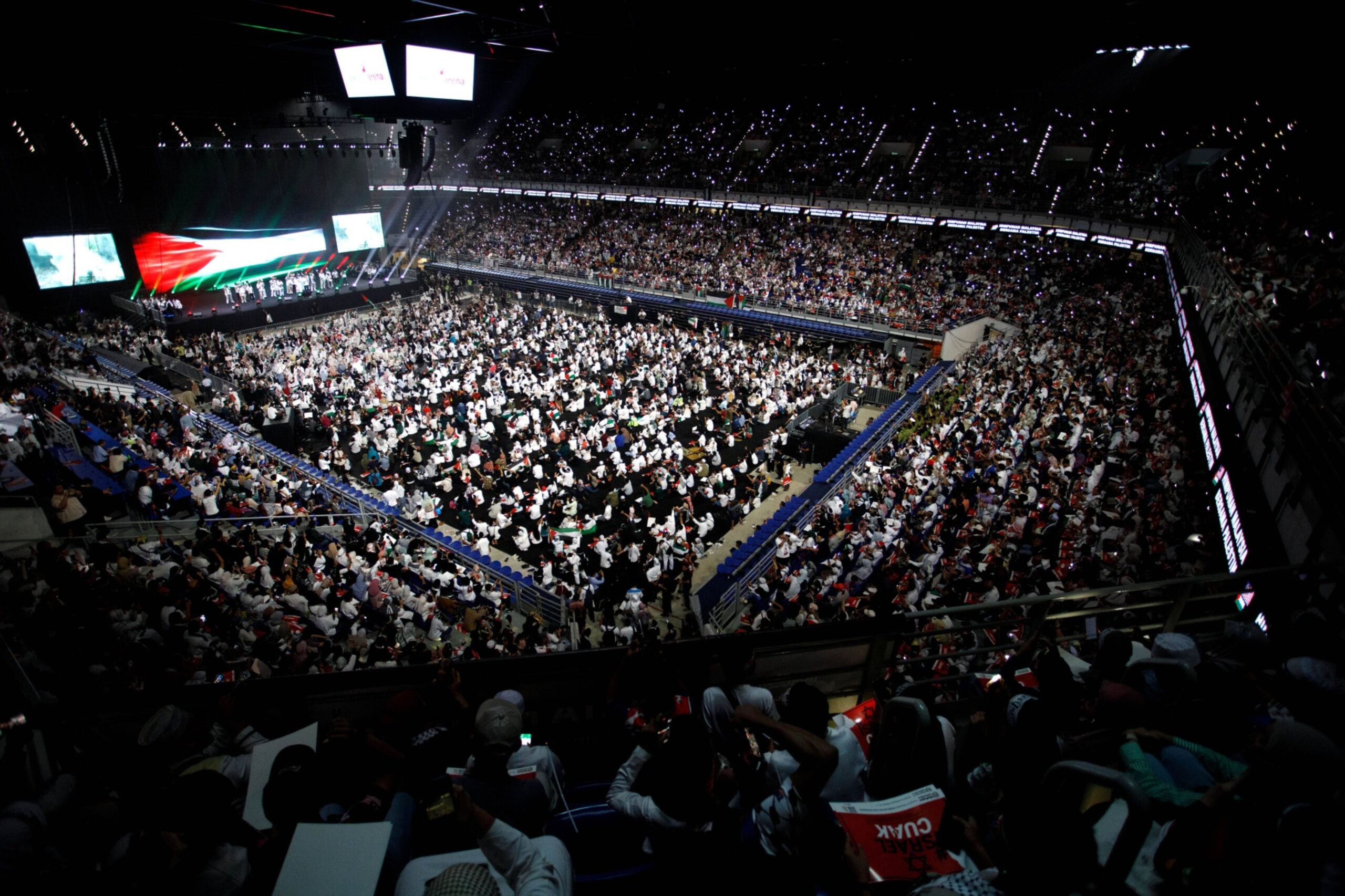KUALA LUMPUR (BLOOMBERG) – Malaysia unexpectedly jumped into the fraught politics of the Israel-Hamas war when Prime Minister Anwar Ibrahim vowed to maintain ties with Hamas even if his government were to come under outside pressure. Anwar has become one of the most vocal leaders in publicly criticising Israel, calling its military operations in Gaza the “height of barbarism.” While political observers say that has made him popular at home by appealing to the Muslim majority, it puts Malaysia at odds with the US, its third-largest trading partner. Here’s a closer look at the history behind Malaysia’s stance.
Is Malaysia pro-Hamas?
While Malaysia hasn’t said outright that it’s pro-Hamas, it maintains ties and reserves the right to engage with the group – listed as a terrorist organisation by the US and European Union – in order to find solutions to the ongoing crisis with Israel. Hamas launched an attack on Israel on October 7, killing around 1,400 people including civilians and soldiers.
Anwar told Parliament in October that Palestinians in Gaza “have been for the last six decades incarcerated in the largest open-air prison in the world.” The Southeast Asian nation views Hamas as the legitimately elected leader of Gaza, Anwar said, though no elections in the enclave have been held since 2006.
Malaysia has long backed a two-state solution, which calls for Israelis and Palestinians to share the Holy Land under separate, independent nations. In his maiden speech at the UN General Assembly in September, Anwar railed against oppression across the globe, including “atrocities” against Palestinians and the “stripping” of their land – moves he said posed challenges to brokering peace. Hamas, which has a history of suicide bombings, has held fast to its stated mission of destroying the state of Israel while other Palestinian leaders have advocated for peaceful coexistence.

How does Malaysia support the Palestinians?
Israel responded to Hamas’s attack on October 7 with airstrikes and military operations in the Gaza Strip it says are aimed at destroying the group. At least 10,000 Palestinians have been killed, according to the Hamas-run health ministry. Malaysian political leaders have taken part in pro-Palestinian rallies and discussed support for the Palestinian cause in Parliament. Malaysia’s education ministry organised a Palestine Solidarity Week program at schools and colleges it oversees.
The Malaysian government manages a Humanitarian Trust Fund for the People of Palestine, which has about RM81 million as of October 19, on the way to its RM100-million goal. It’s earmarked for medical aid, food and basic necessities in Gaza and for any Palestinians affected by the war, according to Anwar.
Malaysia and Palestinian authorities maintain reciprocal embassies. After Hamas seized control of Gaza in 2007, former Malaysian Prime Minister Najib Razak was among the first heads of state to visit. Another former premier, Mahathir Mohamad, posted snippets of a conversation in October with Hamas political leader Ismail Haniyeh, who asked him for help in swaying Western and Israeli narratives. Anwar also posted on X that he had a phone conversation with Haniyeh, expressing Malaysia’s support for the Palestinian people.
What is Malaysia’s position on Israel?
Israel was a supporter of newly independent Malaysia’s admission into the UN in 1957 and traded with the Southeast Asian nation. However, Malaysia’s first prime minister, Tunku Abdul Rahman, started the policy of eschewing formal diplomatic ties with Israel as the Southeast Asian nation sought to bolster its Islamic image.
Today, Malaysian passports contain the inscription “this passport is valid for all countries except Israel.” Israel passport holders are also restricted from entering Malaysia without permission.
Is religion playing a role in Malaysia’s stance?
Malaysia’s foreign policy emphasises “the solidarity of the Ummah,” or Muslim community, and some political analysts say Anwar may be drumming up support for Palestinians partly to shore up his Islamist credentials.
The prime minister said he raised the Palestinian issue during his visits to Saudi Arabia, Iran, Egypt and the UAE in October. He also said several Muslim nations have agreed to an emergency meeting of the Organisation of Islamic Cooperation on the matter.
At the same time, he has stressed the war is a humanitarian crisis and “Palestinian Christians have been victimised just as much as their Muslim brothers and sisters.” Non-Muslim politicians in Malaysia have expressed support for Palestinians in Parliament and in rallies.
How do ordinary Malaysians feel about the Israel-Hamas war?
Citizens have held pro-Palestinian street protests, including one headlined by Anwar and attended by an estimated 16,000 people.
Malaysians have also boycotted fast-food establishments seen to have ties to Israel. After footage spread on social media showing McDonald’s Corp restaurants in Israel distributing meals to soldiers, its Malaysian subsidiary released a statement saying it is 100 per cent Muslim-owned and that the incident doesn’t reflect its values. Starbucks Corp in Malaysia has also been the target of a boycott.

How has Malaysia’s stance affected its relationship with the US?
Anwar said Washington has censured Malaysia for taking a hard line against Israel’s actions. The US is Malaysia’s third-largest trading partner and export destination. Bilateral investment and trade amount to USD1.6 trillion annually, according to government data.
Policy differences haven’t stopped Anwar from seeking new US investment. He plans to meet high-level executives of Alphabet Inc’s Google and Microsoft Corp. while attending the Asia-Pacific Economic Cooperation summit in San Francisco in November, the trade ministry says.
What are the stances of other Southeast Asian countries?
Muslim-majority Indonesia supports the Palestinian struggle for independence and does not have diplomatic ties with Israel. Singapore has said a two-state solution is needed to ensure peace.
Thailand maintains a policy of neutrality while the Philippines swiftly condemned Hamas and recognised Israel’s right to self-defence. The Philippines and Thailand have tens of thousands of migrant workers in total in Israel and Gaza. At least 25 Thai nationals are reported to be among the hundreds of hostages taken by Hamas.






